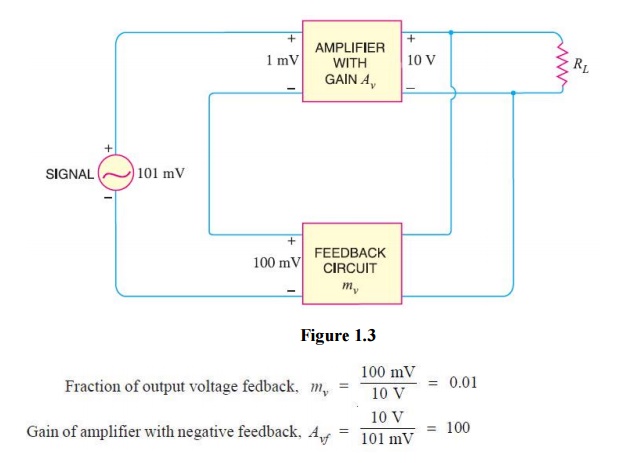Chapter: Electronic Devices and Circuits : Feed Back Amplifiers and Oscillators
Principles of Negative Voltage Feedback In Amplifiers
Principles of Negative Voltage Feedback In Amplifiers
A feedback amplifier has two parts viz an
amplifier and a feedback circuit. The feedback circuit usually consists of
resistors and returns a fraction of output energy back to the input. Fig. 1.3
*shows the principles of negative voltage feedback in an amplifier. Typical
values have been assumed to make the treatment more illustrative. The output of
the amplifier is 10 V. The fraction mv of this output i.e. 100 mV is fedback to
the input where it is applied in series with the input signal of 101 mV. As the
feedback is negative, therefore, only 1 mV appears at the input terminals of
the amplifier. Referring to Fig. 1.3, we have, Gain of amplifier without
feedback,


The following points are worth noting :
ü
When
negative voltage feedback is applied, the gain of the amplifier is reduced.
Thus, the gain of above amplifier without feedback is 10,000 whereas with
negative feedback, it is only 100.
ü
When
negative voltage feedback is employed, the voltage actually applied to the
amplifier is extremely small. In this case, the signal voltage is 101 mV and
the negative feedback is 100 mV so that voltage applied at the input of the
amplifier is only 1 mV.
ü
In a
negative voltage feedback circuit, the feedback fraction mv is always between 0
and 1.
ü
The gain
with feedback is sometimes called closed-loop gain while the gain without
feedback is called open-loop gain. These terms come from the fact that
amplifier and feedback circuits form a ―loop‖. When the loop is ―opened‖ by
disconnecting the feedback circuit from the input, the amplifier's gain is Av,
the ―open-loop‖ gain.
When the loop is ―closed‖ by connecting the
feedback circuit, the gain decreases to Avf , the ―closed-loop‖ gain.
Related Topics